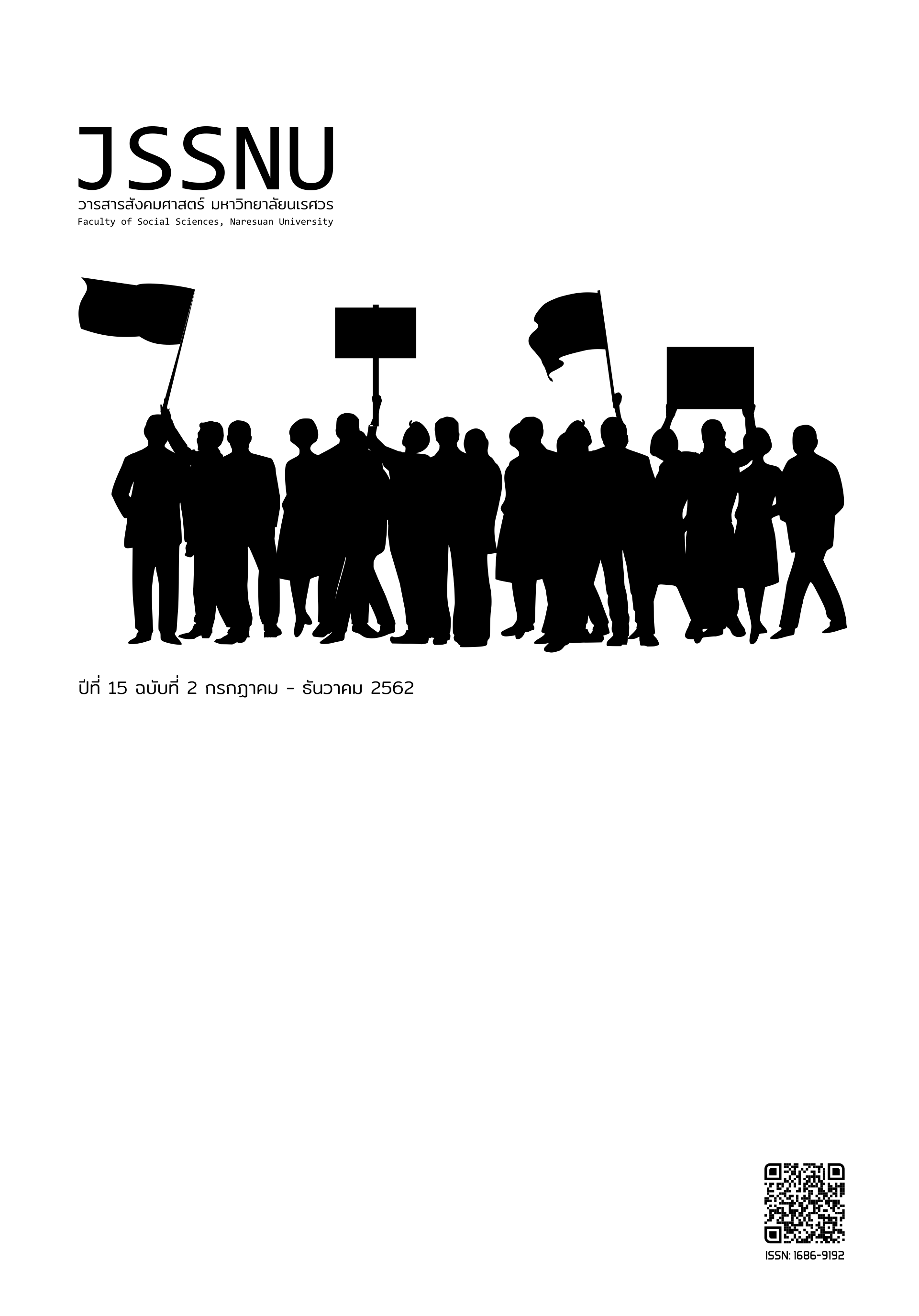Bataille’s Violence: ‘Hole’, ‘Chance’, and the Changing of Human Subject
Main Article Content
Abstract
This article presents violence in the works of Georges Bataille. The main argument is that Bataille’s violence is not physical violence; his violence has nothing to do with the consolidation of the authority of modern state and the transformation of modern state such as war, massacre, and revolution, and so on. Bataille’s violence nonetheless is about the changing of human subject. But antecedent to the change in terms of human subject, they need to encounter with pain and depression caused by modern society and modern state. Thus, in order to understand violence in this dimension, it is necessary to grasp with other concepts of Bataille such as ‘Hole’, ‘Inner Experience’, ‘Chance’, and ‘Heterology’.
Downloads
Download data is not yet available.
Article Details
How to Cite
Supachalasai, C. (2019). Bataille’s Violence: ‘Hole’, ‘Chance’, and the Changing of Human Subject. Journal of Social Sciences Naresuan University, 15(2), 15_137–161. retrieved from https://so04.tci-thaijo.org/index.php/jssnu/article/view/231459
Section
Review Paper
References
เอกสารภาษาอังกฤษ
Bataille, Georges. Roger Caillois, Pierre Klossowski, and Michel Leiris. 2018. The Sacred Conspiracy: The Internal Papers of the Secret Society of Acéphale and Lectures to the College of Sociology. John Harman and Natasha Lehrer (Trans.). London: Atlas Press.
Bataille, Georges. 2010. Guilty. Stuart Kendall (Trans.). New York: Suny Press.
_______________. 2002. Blue of Noon. Harry Mathews (Trans.). London: Marion Boyars Publishers.
_______________. 2001. The Unfinished System of Nonknowledge. Michelle Kendall and Stuart Kendall (Trans.). Minneapolis: University of Minnesota Press.
_______________. 1985. Visions of Excess: Selected Writings, 1927-1939. Allan Stoekl (Trans.). Minneapolis: University of Minnesota Press.
_______________. 1947. ‘Concerning the Accounts Given by the Residents of Hiroshima.’ In Cathy Caruth (eds.) Trauma: Explorations in Memory. Baltimore: The Johns Hopkins University Press.
_______________. 1944. ‘Chance.’ In Fred Botting and Scott Wilson. (eds.). The Bataille Reader. Oxford: Blackwell.
_______________. 1943. ‘The Torment.’ In Fred Botting and Scott Wilson (eds.). The Bataille Reader. Oxford: Blackwell.
Bataille, Georges. 1931. ‘The Solar Anus.’ The Anarchist Library. Accessed January 2, 2019. https://theanarchistlibrary.org/library/georges-bataille-the-solar-anus. Boon, Marcus, Eric Cazdyn, and Timothy Morton. 2015. Three Inquiries in Buddhism. Chicago: University of Chicago Press.
Botting, Fred and Scott Wilson. 1997. The Bataille Reader. Oxford: Blackwell.
Bruns, John. 2014. Loopholes: Reading Comically. New Brunswick and London: Transaction Publishers.
De Bella, Maria Pia. and James Elkins. 2013. Representations of Pain in Art and Visual Culture. London and New York: Routledge.
Ferrari, Silvio. 2013. Current Issues in Law and Religion, Volume 4. Oxon and New York: Routledge.
Geroulanos, Stefanos. 2006. ‘The Anthropology of Exit: Bataille on Heidegger and Fascism’, October, 117(2006): 3-24.
Nietzsche, Friedrich. 1990. Beyond Good and Evil: Prelude to A Philosophy of the Future. R.J. Hollingdale (Trans.). London: Penguin Books.
Nietzsche, Friedrich. 1984. Human, All Too Human. Marion Faber and Stephen Lehmann (Trans.). London: Penguin Books.
Nietzsche, Friedrich. 1956. The Birth of Tragedy & The Genealogy of Morals, Francis Golffing (Trans.). New York: Anchor Books.
Noys, Benjamin. 2000. Georges Bataille: A Critical Introduction. London: Pluto Press.
Stronge, Will. 2017. Georges Bataille and Contemporary Thought. London and New York: Bloomsbury Publishing Plc.
Bataille, Georges. Roger Caillois, Pierre Klossowski, and Michel Leiris. 2018. The Sacred Conspiracy: The Internal Papers of the Secret Society of Acéphale and Lectures to the College of Sociology. John Harman and Natasha Lehrer (Trans.). London: Atlas Press.
Bataille, Georges. 2010. Guilty. Stuart Kendall (Trans.). New York: Suny Press.
_______________. 2002. Blue of Noon. Harry Mathews (Trans.). London: Marion Boyars Publishers.
_______________. 2001. The Unfinished System of Nonknowledge. Michelle Kendall and Stuart Kendall (Trans.). Minneapolis: University of Minnesota Press.
_______________. 1985. Visions of Excess: Selected Writings, 1927-1939. Allan Stoekl (Trans.). Minneapolis: University of Minnesota Press.
_______________. 1947. ‘Concerning the Accounts Given by the Residents of Hiroshima.’ In Cathy Caruth (eds.) Trauma: Explorations in Memory. Baltimore: The Johns Hopkins University Press.
_______________. 1944. ‘Chance.’ In Fred Botting and Scott Wilson. (eds.). The Bataille Reader. Oxford: Blackwell.
_______________. 1943. ‘The Torment.’ In Fred Botting and Scott Wilson (eds.). The Bataille Reader. Oxford: Blackwell.
Bataille, Georges. 1931. ‘The Solar Anus.’ The Anarchist Library. Accessed January 2, 2019. https://theanarchistlibrary.org/library/georges-bataille-the-solar-anus. Boon, Marcus, Eric Cazdyn, and Timothy Morton. 2015. Three Inquiries in Buddhism. Chicago: University of Chicago Press.
Botting, Fred and Scott Wilson. 1997. The Bataille Reader. Oxford: Blackwell.
Bruns, John. 2014. Loopholes: Reading Comically. New Brunswick and London: Transaction Publishers.
De Bella, Maria Pia. and James Elkins. 2013. Representations of Pain in Art and Visual Culture. London and New York: Routledge.
Ferrari, Silvio. 2013. Current Issues in Law and Religion, Volume 4. Oxon and New York: Routledge.
Geroulanos, Stefanos. 2006. ‘The Anthropology of Exit: Bataille on Heidegger and Fascism’, October, 117(2006): 3-24.
Nietzsche, Friedrich. 1990. Beyond Good and Evil: Prelude to A Philosophy of the Future. R.J. Hollingdale (Trans.). London: Penguin Books.
Nietzsche, Friedrich. 1984. Human, All Too Human. Marion Faber and Stephen Lehmann (Trans.). London: Penguin Books.
Nietzsche, Friedrich. 1956. The Birth of Tragedy & The Genealogy of Morals, Francis Golffing (Trans.). New York: Anchor Books.
Noys, Benjamin. 2000. Georges Bataille: A Critical Introduction. London: Pluto Press.
Stronge, Will. 2017. Georges Bataille and Contemporary Thought. London and New York: Bloomsbury Publishing Plc.


